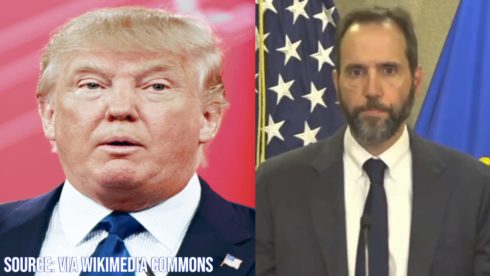Special Counsel Jack Smith has unleashed a major development in the ongoing legal saga surrounding Donald Trump by filing a superseding indictment in the election interference case. This new indictment intensifies the scrutiny on the former president’s alleged involvement in efforts to overturn the 2020 election results. The timing of this move is particularly significant, as it follows the Supreme Court’s recent ruling on presidential immunity, which complicated the original charges against Donald Trump.
In a bid to navigate the legal obstacles posed by the Supreme Court’s decision, the indictment has been meticulously revised. The new version presented to a fresh grand jury is now a streamlined 36-page document, compared to the original 45 pages. Key allegations that the court deemed to be improperly filed have been excised, reflecting the prosecution’s strategic recalibration. This move ensures that the core accusations against Donald Trump remain intact while the case is fine-tuned to better withstand judicial scrutiny.
New Approach, Same Charges
Despite the revisions, the four primary charges against Donald Trump, including conspiracy to defraud the United States and obstruction of an official proceeding, remain unchanged. However, the prosecution has shifted its approach, now focusing more on Donald Trump’s actions as a candidate rather than his exercise of presidential powers. This nuanced adjustment aims to sidestep the Supreme Court’s ruling, which granted Donald Trump immunity for actions tied directly to his official duties as president.
By reorienting the indictment to emphasize Donald Trump’s personal interests in the election outcome, the prosecution argues that his efforts to interfere with the certification of the election were not protected by presidential powers. This redefinition allows the prosecution to sidestep the immunity issue and keeps the focus on Donald Trump’s alleged misconduct, bolstering the strength of the case as it moves forward.
Prosecutors Refine Their Case
The superseding indictment highlights the prosecution’s determination to refine their case in light of the Supreme Court’s ruling. By removing certain allegations and rephrasing others, prosecutors have worked to build a more resilient case that can withstand potential legal challenges. This careful refinement is designed to address any vulnerabilities in the original indictment, ensuring that the prosecution’s arguments are as strong as possible.
This strategic overhaul demonstrates the prosecution’s adaptability and resolve in holding Donald Trump accountable for his alleged actions. The revised indictment is likely to play a critical role in shaping the legal proceedings as the case progresses, setting the stage for a potentially contentious battle in court.
Supreme Court Ruling: A Blessing in Disguise?
While the Supreme Court’s immunity ruling initially posed a significant hurdle for the prosecution, it may have ultimately served as a catalyst for a more focused and effective indictment. By forcing the prosecution to reassess and refine their case, the ruling has led to a streamlined indictment that directly targets Donald Trump’s alleged misconduct without getting bogged down by constitutional questions of presidential immunity.
As the legal battle unfolds, the impact of the Supreme Court’s ruling on the case will become clearer. However, the prosecution’s ability to adapt to the ruling and revise their approach suggests that they remain steadfast in their pursuit of accountability for Donald Trump’s alleged actions. This development could mark a turning point in the case, as the prosecution navigates the complex legal landscape with renewed vigor.
Grand Jury’s Role in the Revised Indictment
The presentation of the superseding indictment to a fresh grand jury underscores the dynamic nature of this high-profile case. Grand juries play a critical role in the judicial process, particularly in cases involving complex legal issues and high-profile defendants. The decision to involve a new grand jury in this phase of the case indicates the prosecution’s commitment to ensuring that the charges are carefully considered and that the legal process is followed meticulously.
This move also highlights the importance of grand juries in holding public officials accountable. The involvement of a fresh grand jury in the superseding indictment process reinforces the idea that no one, not even a former president, is above the law. As the grand jury reviews the revised charges, their findings will be crucial in determining the next steps in this ongoing legal saga.
Backlashes for Donald Trump’s Legal Strategy
The superseding indictment presents new challenges for Donald Trump’s legal team, who must now contend with a refined and potentially more formidable case. The changes made by the prosecution, particularly the shift in focus away from presidential immunity, require Trump’s defense to adapt their strategy accordingly. This could involve re-evaluating their arguments and possibly exploring new legal avenues to counter the revised charges.
As the case progresses, Donald Trump’s legal strategy will be closely scrutinized, with observers keen to see how his defense team responds to the updated indictment. The stakes are high, not only for Donald Trump but also for the broader legal and political landscape. The outcome of this case could have far-reaching implications, potentially setting new precedents for how the legal system addresses allegations of misconduct by high-ranking officials.














